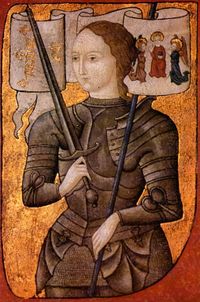But Joan of Arc--now, there was a saint I could get interested in emulating--armour, horses, strong, advisor to the French king Charles VII--except for hearing voices, which spooked me a bit. I knew she had died horribly, but somehow my adolescent mind skittered away from that, sure that in my case it would have been different.
She made me think about honour, though, and what was worth dying for. I read a novel that included her as one of the characters, and at the end, another character, who loved her, had managed to get a place at a window in the market square in Roen where she was to be burned. He had a cross-bow, and his plan to was to shoot her before she suffered too much. He didn't care if he was caught and executed himself; he wanted to spare her. But his friend talked him out of it. He said that Joan had refused to recant, knowing what lay in store for her; she went, in some measure, willingly to the flames. Could he (the lover) decide that Joan had made the wrong choice? It was Joan's life, and Joan's choice to make, and not the lover's. In the end, the lover sees that his friend is right, and leaves town rather than see her die. It was heart-wrenching, but I understood, even at 15 or so, that we cannot make decisions for others--if a person is capable of making that decision, then we must allow her to know what is best for her life. We may not agree, but we cannot make someone's else's life decision.
I have a feeling that, while the character of Joan's lover was not based on a known historical figure, there was probably more than one person like that in the crowd, who wanted to spare her agony, but who also understood that this was her choice, her testimony, her witness. She could not lie about the voices she heard; she could not pretend to confess to witchcraft in order to save her life. She died with integrity.
Many people in the gay, lesbian, bisexual and transgendered community take Joan as their saint, because she cross-dressed, she dared to speak her truth, and she was truthful about who she was and her call in the world. She did not, could not, pretend to be the quiet, dutiful woman she was "supposed" to be. She did what she heard God telling her to do, and not what the world felt she should do.
She's somewhat controversial, and has been used by many political and religious groups as a figurehead, because of her reputatoin as the champion of the marginalized (Charles was fighting to get northern France back from the English). So take it all with a grain of salt if you like. I admire her, personally. Joan did what she felt she had to do, even if powerful people didn't approve.
She was an "uppity woman," and may God bless her and her memory forever.

1450 - 1500
Centre Historique des Archives Nationales, Paris



No comments:
Post a Comment